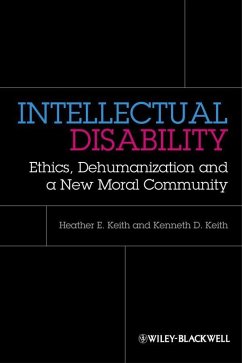Dieser Download kann aus rechtlichen Gründen nur mit Rechnungsadresse in A, B, BG, CY, CZ, D, DK, EW, E, FIN, F, GR, HR, H, IRL, I, LT, L, LR, M, NL, PL, P, R, S, SLO, SK ausgeliefert werden.
"This well-thought-out reference is grounded in thoroughresearch with an engaging narrative. Summing Up: Highlyrecommended. Lower-level undergraduates and above; generalreaders." (Choice, 1 March 2014)
"It is entirely refreshing to read about intellectual disabilityfrom a philosophical and social perspective. I would recommend thisbook to anyone with an interest in intellectual disability (be itclinical, academic or personal). It is a useful piece of literaturethat will aid anyone involved in this field to more readilyappreciate the social, moral and historical context of intellectualdisability, while providing a useful framework to consider for thefuture." The International Journal of DevelopmentalDisabilities
One of the greatest challenges facing the field of intellectualdisability in today's transformational era is that we willforget from where we have come. The inclusion of people withintellectual disability into the mainstream of life is based on theprinciples of inclusion, empowerment, equity, andself-determination. This well-written and conceptually solid book contributes significantly to both our understanding ofthe past attitudes towards people who are now coming out of thedarkness, and the ethical and moral challenges we continue to faceto enhance their quality of life.
--Bob Schalock, Professor Emeritus, HastingsCollege.
Intellectual Disability: Ethics, Dehumanization, and a NewMoral Community is a welcome piece of scholarship that draws onphilosophy and several other fields to provide a thoughtful accountof what shapes our thinking about intellectual disability. Filledwith stories and historical facts presented in a highly interestingway, all from a captivating assortment of approaches, this book ishard to set down.
--Professor Ivan Brown, Centre for Disability Studies,Brock University, Canada and Associate Director, IASSIDD Academyfor Teaching, Learning, and Research.
Marshaling a broad command of the relevant literature frompsychology and philosophy, the authors open new vistas ofunderstanding on a subject of great importance for the future ofhuman society. They succeed in bringing moral issuesconcerned with intellectual disability from the margins ofunderstanding to a bright new sympathetic intelligibility.
--Larry A. Hickman, Professor of Philosophy and Director ofthe Center for Dewey Studies, Southern Illinois UniversityCarbondale.
This concise and thoughtful book skillfully guides the reader toconsider recent changes for good in the lives of many people withintellectual disabilities. A rich trove of publishedreferences spanning many disciplines will gladden the hearts ofmany scholars. This book invites us to shape, to seize and tobenefit from the changes yet in store.
--Patricia Noonan Walsh PhD, Professor Emerita ofDisability Studies, University College Dublin.


